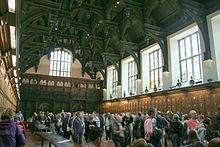
The revels were a traditional period of merrymaking and entertainment held at the Inns of Court, the professional associations, training centres and residences of barristers in London, England. The revels were held annually from the early 15th to the early 18th centuries and were an extension of a general nationwide period of entertainment running from All Saints' Eve (31 October) to Candlemas (2 February), though in some years they lasted as late as Lent. The inns elected a "prince" to lead the festivities and put on a sequence of elaborate entertainments and wild parties. The events included singing, dancing, feasting, the holding of mock trials and the performance of plays and masques. The revels played an important part in encouraging early English theatre and provided William Shakespeare with one of his most distinguished audiences in his early career. Several plays were written specifically for the revels and legal scenes in many plays from this era may have been written with this audience in mind. The revels declined in the 17th century and they last appear to have been held in 1733. The inns revived the revels in the mid 20th-century and they now comprise a seasonal offering of entertainment in the form of sketches, songs and jokes.